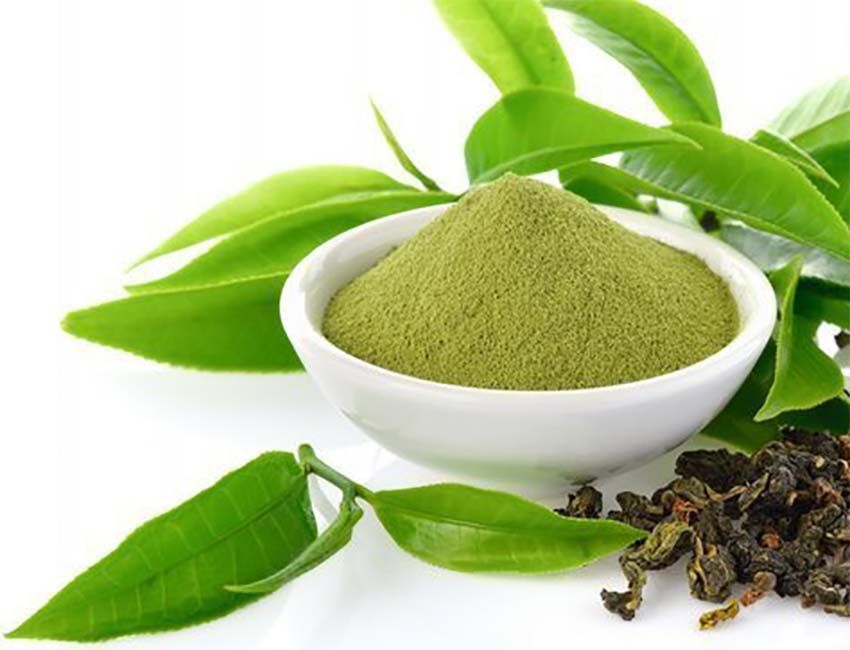Green Tea Leaf Extract
Health Benefits of Green Tea Extract
English Name: Green tea extract
Latin Name: Camellia sinensis
Type: Botanical
What is Green Tea Extract?
Drinking tea has been an important part of Chinese cultural and medicinal practices for centuries. A book dated to the Tang Dynasty of 600-900 A.D. specifically lays out how ancient Chinese people grew, processed and consumed green tea for a healthier, happier life. Now cultivated throughout Asia, green tea refers to tea leaves that are harvested and immediately steamed to avoid the fermentation that produces Oolong or black tea. The steaming process preserves the green color of the leaves as well as their natural polyphenols, the components linked to health benefits1. Green tea is a popular alternative to coffee as a beverage that stimulates wakefulness without the jittery side effects, and it is regularly consumed in most of Asia, Europe and North America. As a health supplement, green tea extract is often included in regimens aimed at weight control, physical performance and general good health. Modern research continues to study the health effects of green tea extract in humans, including how it affects cholesterol levels, heart disease and oral health.
How does Green Tea Extract work?
Green tea leaves contain a combination of compounds known as polyphenols, a complex group of naturally occurring micronutrients that give the leaves their color and help them thrive in their natural environment. Scientists have identified the largest group of polyphenols in green tea as flavanols, also called catechins. Polyphenols are powerful antioxidants that help the body process toxins and also protect cells from degenerative damage. Catechins have also shown antiviral and antifungal capacities in laboratory studies. The high mineral content of green tea has been shown to increase bone mineral density, which may protect against certain types of fractures. The anti-inflammatory properties of green tea have myriad possibilities in applications from bug bites to kidney stones to immune system support1.
What are the benefits of Green Tea Extract?
Ancient Chinese practitioners knew well the benefits of treating diarrhea and typhoid with green tea. Modern researchers have found drinking green tea to be highly effective against viruses like influenza, herpes simplex and adenovirus1. Green tea extracts can reduce levels of LDL or “bad” cholesterol without affecting levels of HDL or “good” cholesterol, and they have been linked to lower blood pressure and a lowered risk of stroke and coronary disease2. A particular amino acid in green tea, L-theanine, is thought to stimulate mental alertness and relaxation without sleepiness. The effect of green tea on weight loss is evident in ongoing studies, as it supports a healthy metabolic rate during periods of decreased caloric intake. The combination of catechins and caffeine in green tea show promise for preventing obesity without the negative effects of ephedrine3. Studies have also shown that green tea is effective in reducing halitosis, aka bad breath4.
Products Featuring Green Tea Extract
For Humans:
Inflam Dr™ for Whole Body Health

Native Remedies recommends you consult your doctor before introducing new herbal products into your regimen. Always ensure you are buying high-quality, laboratory-tested supplements from a reputable supplier. At Native Remedies, we back all our products with a 100 percent money-back guarantee. If you’re not happy with your purchase after trying it for 30 days, simply send it back for a refund. Here’s to your good health!
The content provided is for informational purposes only. It is not a substitute for professional medical advice. If you have a health condition, please consult a medical professional and do not use this information to self-diagnose or self-treat.
Resources:
[1] Chacko, Sabu M., Priya T. Thambi, Ramadasan Kuttan, and Ikuo Nishigaki. "Beneficial Effects of Green Tea: A Literature Review." Current Neurology and Neuroscience Reports. April 6, 2010. Accessed October 05, 2018. https://www.ncbi.nlm.nih.gov/pmc/articles/PMC2855614/. DOI: 10.1186/1749-8546-5-13
[2] Zheng, X. X., Y. L. Xu, S. H. Li, X. X. Liu, R. Hui, and X. H. Huang. "Green Tea Intake Lowers Fasting Serum Total and LDL Cholesterol in Adults: A Meta-analysis of 14 Randomized Controlled Trials." Current Neurology and Neuroscience Reports. August 2011. Accessed October 05, 2018. https://www.ncbi.nlm.nih.gov/pubmed/21715508.
[3] Wolfram, S., Y. Wang, and F. Thielecke. "Anti-obesity Effects of Green Tea: From Bedside to Bench." Current Neurology and Neuroscience Reports. February 2006. Accessed October 05, 2018. https://www.ncbi.nlm.nih.gov/pubmed/16470636.
[4] Moghbel, Abdolhossein, Ahmad Farjzadeh, Nasrin Aghel, Homaun Agheli, and Nafiseh Raisi. "Evaluation of the Effect of Green Tea Extract on Mouth Bacterial Activity in the Presence Pf Propylene Glycol." Current Neurology and Neuroscience Reports. May 28, 2012. Accessed October 05, 2018. https://www.ncbi.nlm.nih.gov/pmc/articles/PMC3941855/.
Reviewed by Master Herbalist, Mary Ellen Kosanke